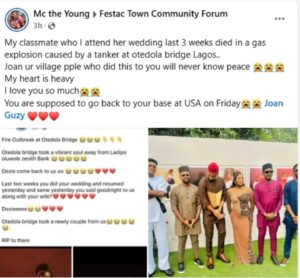Trending
The Attorney-General of the Federation (AGF) and Minister of Justice, Lateef Fagbemi, SAN, has said the case of the detained leader of banned Indigenous People of Biafra (IPOB) is a difficult one that should be left to the law to have his way since its already in court.
Published
10 months agoon
By
Ekwutos Blog
Fagbemi stated this while responding to questions from newsmen at the Sectoral Ministerial Briefing on the first anniversary of the President Bola Tinubu administration in Abuja on Friday.
He pointed out that there is a remarkable difference between Kanu’s case and that of the convener of #RevolutionNow protester, Omoyele Sowore.
He said, “Sowore and Kanu are not the same, when it comes to the first one, I didn’t have difficulty to say go, but I have difficulty with the second one”.
Pointing out that Kanu is being held in accordance with the Constitution, Fagbemi observed that, “the matter is still in court, let’s wait for the court”.
Sowore was arrested in 2019 and prosecuted for allegedly calling for the forceful take over of the administration of former President Muhammadu Buhari.
However, the Federal Government through the office of the AGF in February filed a notice of discontinuation of the case.
The minister also stated that the Federal Government has secured 250 convictions from the prosecution of terrorism and criminal offices in various courts across the country.
The AGF who reeled out the achievements of the Ministry of Justice under the year under review, said in furtherance with the Ministry’s mandate of enhancing national security and safety through prosecution, the Federal Government has secured 160 convictions for criminal offences, 87 convictions for terrorism cases, 3 novel convictions in the last one year for extremist terrorism actors involved in the radicalisation of children and violence against women.
Fagbemi hinted that the Justice Ministry in conjunction with relevant security and law enforcement agencies have developed a framework for joint investigation and collaboration geared towards the engagement of prosecution-guided investigation in various criminal cases with a bid to address the challenges to successful prosecutions.
“There is also enhanced inter-agency synergy for prosecution of Maritime Cases, Electricity offences, collaboration with public and private sector stakeholders on cybersecurity protection and cybercrime prosecution,” the AGF said.
Following the Ministry’s intervention for the upgrade of facilities designated for trial of terrorism cases, Fagbemi said the Ministry has resumed trials of terrorism cases in conjunction with the Legal Aid Council, National Human Rights Commission and other stakeholders.
He added that the percentages of terrorism cases initiated and corruption cases concluded within the reporting period have been significant.
The AGF further stated that the Tinubu administration has facilitated international cooperation on terrorism financing and other transnational crimes.
Fagbemi also said the Federal Government has secured the conviction of 13 terrorism financing cases, and also concluded 150 mutual legal assistance requests and 12 extradition requests from law enforcement agencies and foreign countries.
“The Ministry places priority on enhancing the prosecutorial and litigation capacity of its staff, to this end, it organised capacity building programmes to improve knowledge on various aspects of the law, including Darknet and Cryptocurrencies applied to terrorism financing, investigation and prosecution of financial and wildlife crimes in Nigeria.
“The coordination of the effective implementation of the National Anti-Money Laundering/Combating Proliferation Financing (AML/CPF) Strategy 2023 – 2027 is also a top priority for the Ministry,” the AGF said.
Moreso, in line with the cardinal principle of the present administration in the fight against corruption, the Justice Ministry, Fagbemi said, has achieved successes under its international asset recovery and management efforts.
The asset sharing agreement between the Federal Republic of Nigeria and the Bailiwick of Jersey was signed in February 2024, for the return of £2,125,944 (Two Million, One Hundred and Twenty-Five Thousand, Nine Hundred and Forty-Four GBP) proceeds of corruption, the AGF revealed.
“This has been approved by the President to be utilised for continuation of works on the Abuja-Kano Road project” Fagbemi said.
On the Glencore settlement, the Minister said the ministry on behalf of Nigeria on April 25, 2024, concluded negotiation of a settlement agreement with Glencore International A.G. wherein the firm is expected to pay the sum of $50 million USD as penalty and compensation for certain activities in Nigeria.
Also, speaking on the development of the proceeds of Crime Recovery and Management Regulation 2024 by the ministry, the AGF said the objective of the regulation which is being developed with relevant agencies is to ensure transparency, accountability and standardisation in the management of recovered assets, in line with global best practices.
“This document is being finalised for validation,” the AGF said.
Follow Ekwutosblog for more…
You may like


Stop Igbo persecution, release Chukwu Sunday Obasi – Nnamdi Kanu’s lawyer, Ejimakor


Here are the three bills passed by the Rivers State House of Assembly on March 14, 2025


VIDEO: Fubara is already down, more to come for him — Wike boasts


Nigeria Customs Set to Introduce Automated Transire Process, Sensitises Officers, Stakeholders


“I’m not a fraudster”, Hope UZODINMA media aide Ambrose Nwaogwugwu affirms


Minister of the Federal Capital Territory, FCT, Nyesome Wike, has said that he has no plan to stop members of the Rivers State House of Assembly from performing the constitutional duties.
Trending
Newly married couple d!es in Otedola Bridge gas tanker explosion
Published
14 hours agoon
March 15, 2025By
Ekwutos Blog
A newlywed couple, Dozie and Joan Okoye, d!ed in the gas explosion on the Otedola Bridge along the Lagos-Ibadan Expressway.
It was gathered that the couple got married on February 22, 2025.
According to reports, Dozie and Joan were on the way home when their phone lines suddenly became reachable.
After searching for them at the Burns Center in Gbagada and Yaba Mortuary, their charred remains were finally found on Wednesday evening.
The only identification was their car’s registration number, which was found among the burnt vehicles.
The explosion, which occurred at 8:08 pm on Tuesday, March 11, 2025, was caused by a 30-tonne tanker carrying gas products, said to be owned by a nearby gas station.
The blast severely affected a Dental Clinic, while the generator house and security post of a nearby church building also sustained significant damage.
Responders recovered four charred bodies, including that of an auto mechanic identified as Rotimi Adeleye.



Trending
Provide evidence or drop allegations against Akpabio, Adeyanju tells Natasha
Published
1 day agoon
March 14, 2025By
Ekwutos Blog
Human rights lawyer and activist, Deji Adeyanju, has called on Senator Natasha Akpoti-Uduaghan (Kogi Central) to present concrete evidence to back her allegations of sexual harassment against Senate President Godswill Akpabio.
Speaking at a press conference in Abuja on Friday, Adeyanju stated that without verifiable proof, Nigerians should not dwell on the matter.
He urged the public to focus on more pressing issues, such as the Tax Reform Bill and its potential impact on low- and middle-income earners.
According to him, solid evidence would lend credibility to Akpoti-Uduaghan’s claims and warrant public scrutiny of Akpabio’s actions.
However, without such proof, the allegations remain unsubstantiated.
Adeyanju also argued that the controversy had been overflogged and should be resolved in court.
He criticised the selective outrage over the issue, noting that there was little public reaction when lawmakers received luxury cars and budgetary allocations.
He also questioned why the same senators now engaged in the dispute did not oppose the anti-people policies of the current administration.
“The question I have asked is this: when all these anti-people policies of the Tinubu government were being implemented, why didn’t these senators—who are now fighting over allegations of sexual harassment and concerns about ’embarrassing the Senate’—speak out against them?”
“When lawmakers were sharing cars in the National Assembly, there was no fight. When they were distributing money and budgetary allocations, there was no fight. But now, suddenly, we are hearing about a fight.”
Adeyanju further stated that Senator Akpoti-Uduaghan should, as a matter of necessity, make public credible evidence to support her claims, especially since she has been denied a fair hearing in the Senate.
He said, “Senator Natasha has alleged that the Senate President tried to sexually harass her. Since the Senate has refused to give her a fair hearing, she should present credible evidence to back up her claim.”
“It’s very simple. The man has denied the allegation. So, if there are messages—perhaps invitations or suggestive remarks—she should reveal them and expose him. After all, he who alleges must prove.”
Trending
Pandemonium struck after a 31-year-old man, identified as Ajayi Nicholas, allegedly slumped and died inside a sex worker’s room at New Kutunku community in Gwagwalada Council Area of the Federal Capital Territory (FCT).
Published
1 day agoon
March 14, 2025By
Ekwutos Blog
Pandemonium struck after a 31-year-old man, identified as Ajayi Nicholas, allegedly slumped and died inside a sex worker’s room at New Kutunku community in Gwagwalada Council Area of the Federal Capital Territory (FCT).
A resident of New Kutunku, Josiah Gabriel, told Ekwutosblog that the incident happened last Saturday around 5pm when the deceased allegedly checked into a hotel room in the area.
According to him, the man allegedly slumped when he was about to leave the room and the woman rushed to alert the manager of the hotel.
He said the hotel manager identified the deceased and rushed to report the incident to his relations, who are residing within the area.
Gabriel said the deceased was taken to a nearby hospital where he was confirmed dead.

Meanwhile, the corpse was taken away and deposited at the morgue for autopsy by policemen who arrived the hotel, while the lady in question was detained by the police.

Stop Igbo persecution, release Chukwu Sunday Obasi – Nnamdi Kanu’s lawyer, Ejimakor

Here are the three bills passed by the Rivers State House of Assembly on March 14, 2025

VIDEO: Fubara is already down, more to come for him — Wike boasts
Trending
- Politics1 year ago
Nigerian Senate passes Bill seeking the establishment of the South East Development Commission.

 Trending5 months ago
Trending5 months agoNYA demands release of ‘abducted’ Imo chairman, preaches good governance
- Business5 months ago
US court acquits Air Peace boss, slams Mayfield $4000 fine

 Politics5 months ago
Politics5 months agoMexico’s new president causes concern just weeks before the US elections
- Entertainment5 months ago
Bobrisky transferred from Immigration to FCID, spends night behind bars
- Entertainment5 months ago
Bobrisky falls ill in police custody, rushed to hospital

 Politics5 months ago
Politics5 months agoRussia bans imports of agro-products from Kazakhstan after refusal to join BRICS

 Politics5 months ago
Politics5 months agoPutin invites 20 world leaders

